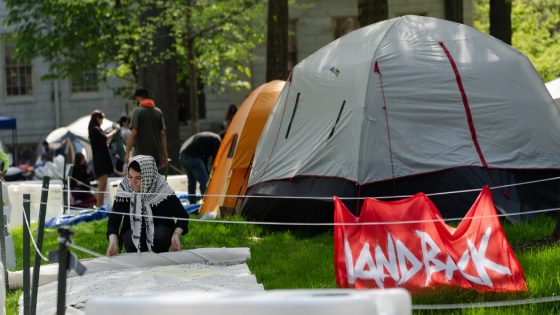Harvard University and student protesters announced on Tuesday that they had negotiated an end to a pro-Palestinian encampment in Harvard Yard, with the university agreeing to discuss student questions about its endowment related to the war in Gaza and to quickly process petitions for the reinstatement of suspended students. The apparently peaceful outcome is one that has eluded some other colleges and universities, where officials have resorted to calling the police to clear demonstrators.
The coalition orchestrating the three-week-old encampment, Harvard Out of Occupied Palestine, known as HOOP, announced that it had “democratically voted to end its encampment after 20 days.”
The agreement at Harvard followed similar deals to end student encampments at more than a dozen other campuses over the last few weeks. At universities like Brown and Northwestern, students obtained concessions including meetings with trustees to discuss divestment and scholarships for Palestinian students. The University of Wisconsin-Milwaukee agreed to call for a cease-fire in Gaza.
But at Harvard, the two sides’ statements about the agreement differed in nuance. The student coalition suggested that Harvard had caved in to its demands, while Harvard asserted that it was willing merely to open a dialogue about the demands, and had not committed to taking any action.
On the student demand for divestment from Israel, for instance, Harvard maintained that what the administration had agreed to do was to offer the students a kind of tutorial on how its $49.5-billion endowment worked.
Harvard has held meetings about investments in the past with students who raised concerns about other issues. On energy and climate, for example, Harvard agreed not to make new investments in fossil fuels and to wind down its existing ones.
“I will facilitate a meeting with the chair of the Corporation Committee on Shareholder Responsibility and other University officials to address questions about the endowment,” Harvard’s interim president, Alan Garber, said in an email to the Harvard community on Tuesday.
The student coalition said that the university had agreed to meetings with the Harvard Corporation, the university’s governing board, and the Harvard management company, which controls its endowment. “Students will set the agenda, to begin discussions on disclosure, divestment and reinvestment,” the coalition said.
But in his statement on Tuesday, Dr. Garber never mentioned the word divestment.
The students said in their statement that Harvard had agreed to consider creating a Center for Palestine Studies. Dr. Garber, however, was much vaguer.
“In keeping with my commitment to ongoing and reasoned dialogue,” Dr. Garber wrote, “the dean of the Faculty of Arts and Sciences and I will meet with students to hear their perspectives on academic matters related to longstanding conflicts in the Middle East.”
Concerning discipline, the student coalition said that the university had offered to extend leniency to the protesters, in part by retracting suspensions and beginning reinstatement proceedings immediately. “The university is backing down on disciplinary measures and has agreed that over 60 students and student workers currently facing disciplinary procedures will have those cases expedited in line with precedents of leniency for similar actions in the past,” the coalition statement said.
Dr. Garber’s statement said it would be up to individual schools under the Harvard umbrella to decide whether to roll back sanctions against students. But he said that “with the disruption to the educational environment caused by the encampment now abated,” he would ask the schools to quickly initiate reinstatement proceedings and evaluate the disciplinary cases against participants in the encampment.
Some students criticized Harvard over the agreement.
“Harvard capitulated to the protesters,” said Josh Kaplan, an Orthodox Jewish undergraduate majoring in computer science who is on the student board of Harvard Chabad, a Jewish group.
“I think this shows many that the only way to get attention from the school is to be disruptive and to violate rules,” he added. “If you do so, you won’t be punished. I don’t see how Harvard will be able to enforce any of their rules in the future.”
The student coalition acknowledged in its statement that the encampment was foundering as students left the campus with the end of the academic year. Harvard had put pressure on protesters by suspending some of them and barring them from campus. And on Monday, Harvard police officers circulated through the encampment taking photographs, leading many protesters to fear that the police would soon move in to clear the encampment.
The students lost some public sympathy and drew accusations of antisemitism when they displayed a poster depicting Dr. Garber as a devil sitting on a toilet, under the words, “Alan Garbage funds genocide.”
The coalition said its encampment had “outlived the last day of classes, finals week and move-out weekend: a testament to the tenacity of our movement.” But it added, “there is no liberation in isolation.”
Vimal Patel contributed reporting.
Source Agencies




